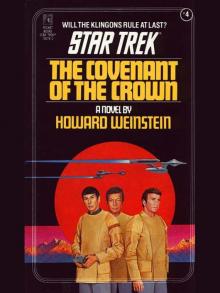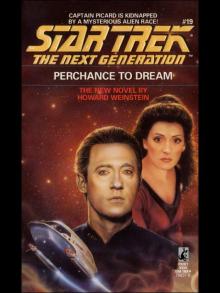- Home
- Howard Weinstein
PRECHANCE TO DREAM Page 15
PRECHANCE TO DREAM Read online
Page 15
Picard appraised the bottle label. “Not a great vintage, but reasonably good.” He took a taste and gave it a genteel swish around his mouth before swallowing. “So what do you think of my home village?”
Arit sipped the wine and smiled at him. “A refreshing distraction, Picard—which is what you had in mind, isn’t it?”
Picard gave a confessional shrug. “Guilty as charged. Once the immediate threat to your ship had been taken care of, I thought a bit of diversion might benefit both of us while we waited for Commander La Forge’s evaluation to be completed.”
“Well, I hate to admit it, but you were right. Our basic conflict has yet to be resolved. Some time to clear our heads couldn’t hurt.” She shook her head in amazement as she glanced around. “But I still can’t believe we’re on your ship’s holodeck. I’ve never seen technology like this. It all seems so real.”
“Well, it is real, in a sense. This is a perfect reproduction of what Labarre was like the last time I was home, just a few months ago. Right down to Henri and the lovely waitress.”
Arit gazed wistfully off into the distance. “Home,” she sighed. “Could this holodeck of yours recreate my hometown?”
“It can simulate any setting, real or imaginary, if the computer has enough information to design a sufficiently complete matrix. Why do you ask?”
“Mmm, no special reason,” she shrugged. “You know, my daughter never got to see Tenira. She was born after we resettled. She has no idea where she came from, what her homeworld was like, before . . .”
As her voice trailed off, Picard could sense her regret, but the intercom tone sounded before he could say anything sympathetic. “Riker to Captain Picard.”
Picard touched his insignia communicator. “Picard here. What is it, Number One?”
“Geordi is ready with his evaluation and he’s on his way to the bridge.”
Picard downed the rest of his wine and stood. “In that case, so are we.”
“Correlation complete,” the computer said in its flat female voice, then displayed a graph on the viewscreen with a green indicator line showing energy output readings recorded by the Enterprise sensors during the time the ship had been orbiting Domarus Four.
Geordi La Forge glanced around the conference-lounge table at Riker, Beverly, Worf, Picard and the Teniran captain as they waited for him to share his findings. The chief engineer traced his finger along the graph, beginning at the far left where the green line was virtually flat, hardly registering at all.
“Now, back here, when we first entered orbit, most of this is just normal background radiation.” The indicator line rose at a gentle angle. “Then here—that’s where something started happening, a noticeable increase in energy output.”
“Caused by what?” Riker asked.
“I have no idea, Commander,” Geordi said. As he slid his finger to the right, he reached a sudden peak in the graph, which matched up with a blinking red point. “Then we get to here—the first big jump in energy output coincides exactly with the first appearance of that chromatic energy phenomenon and the disappearance of the shuttlecraft.”
The rest of the graph showed a continuing rise in energy output over time, marked by occasional and irregularly spaced peaks separated by long, flat valleys. As time elapsed, Geordi pointed out, the peaks were coming with greater frequency and intensity.
Dr. Crusher’s brow furrowed in concentration. “It’s almost like contractions at the end of pregnancy.”
“Doctor,” Picard said wryly, “are you suggesting something is about to give birth down there?”
“I was just commenting on the parallels, Captain.”
“Commander La Forge,” Arit said, “each energy peak has a corresponding flashing marker. I take it that means that each peak is concurrent with a specific and major incident, like the various unexplained appearances and disappearances of Captain Picard and myself?”
“That’s right, Captain.” Geordi pointed to one of the middle peaks, higher than the others and of considerably greater duration. “This one occurred at the time of that quake you both experienced, and persisted through much of that overnight period—”
“Meaning,” said Riker, “that it matches up with the apparent creation of that new mountain range?”
“Exactly, sir,” Geordi said.
Picard rubbed his chin pensively. “Mr. La Forge, are you theorizing that those bursts of chromatic energy caused these specific events?”
“We can’t be conclusive about cause and effect, Captain,” Geordi said. “But there’s almost no question that they’re related in some way.”
“Computer,” Picard said, “estimate probability of causative relationship.”
“Ninety-two point four-six percent probability.”
“Hypothesis: that these incidents catalogued by Chief Engineer La Forge represent attempts at communication by as-yet unknown sentient life forms on Domarus Four. Confirm or refute.”
Eyebrows rose around the table as Picard’s inferential leap caught the rest of the conferees by surprise. The computer took only an instant to consider the query and formulate its reply.
“Insufficient data for conclusive deduction,” it said.
“All right. Just calculate the probability, then,” Picard said with a casual wave of his hand.
“Eighty-six point two-two-eight-six percent probability that this hypothesis is correct.”
“Do you really think there’s that kind of pattern here, Jean-Luc?” Beverly asked.
With a contemplative breath, he mulled the question. “Perhaps it’s a hunch as much as anything in the way of firm evidence, but I do believe there is an intelligence at work on Domarus.”
“An intelligence?” Beverly repeated. “What kind?”
“If it was a life-form like our own,” Riker said, “we’d probably have picked up at least some hints of that by now. So, more than likely, it’s nothing like us.”
Picard nodded. “Agreed. If, for the sake of argument, we accept that foundation, then it is certainly within the realm of possibility that this intelligence— whatever its form—would at some point try to communicate with us.” He paused and glanced around the room. “Reactions?”
“If this theoretical intelligence is totally different from us,” Arit said, “it is quite probable that we and it would not speak anything even remotely resembling the same language.”
“Which fits in with your question to the computer,” Beverly said to Picard. “Is something trying to communicate with us in a way we’re just not understanding, or even realizing?”
Picard got up from the table and approached the computer screen. “If we follow this course of reasoning, and allow ourselves to be guided by Geordi’s graph, then there is a suggestion that quite a few of the specific ‘peak incidents’ came about in response to actions taken by the Enterprise and the Glin-Kale—or at least considered by Captain Arit or myself.” He pointed to a succession of the blinking marker spots. “Here, for instance, is our initial confrontation over the shuttlecraft—here, here and here, our escalating verbal hostilities. Each incident, followed immediately by the appearance of the chromatic energy field— and that, in turn, followed by our abrupt transfers to the planet and to each other’s vessels.”
“Picard,” Arit said, leaning forward, “are you saying that this intelligence that we can’t understand . . . somehow understands us . . . and keeps meddling in our encounters?”
“So it would seem.”
Beverly let out a low whistle. “Am I the only one who finds that a bit unnerving?”
Captain Picard glanced her way. “Unnerving? How so, Doctor?”
“Something we can’t see—can’t locate—can’t talk to—and it may be shouting right in our ears? Or at least, it thinks it is. And we just don’t get it. If it were me in that position, I’d start to get a little frustrated after a while. And frustrated intelligence can turn hostile.”
“I agree with Dr. Crusher,” said Worf, breaking h
is silence.
From the flicker in her eyes, Picard had the distinct notion that Beverly was not all that comfortable to find herself in concurrence with the Klingon security chief. On such matters as contact with mysterious life-forms, she tended toward the open-handed approach, while Worf—by virtue of instinct and job training—preferred the well-formed fist. “Would you care to elaborate, Mr. Worf?” said Picard.
“The forces originating on the planet pose a potentially lethal danger to the Enterprise. If we are dealing with a form of sentient life we do not understand, it will be that much more difficult to defend ourselves if this life form does become hostile.”
Captain Arit thumped her hand on the table. “I also agree with that, Picard.”
Picard’s mouth thinned to a thoughtful line. “Hmm. I acknowledge the value of such caution, but I see no alternative to taking the risk. If we are to solve this riddle, retrieve our shuttle and determine if Domarus is safe for the Tenirans to settle, then we need more information.”
Arit looked at him. “And how do we go about getting it?”
“By making a greater effort to stimulate communication. The more response we are exposed to, the more likely we are to figure out a key to understanding who or what we are dealing with.”
A dubious expression crossed Arit’s face. “What do you mean, ‘stimulate communication’?”
“I think I see what you’re getting at, sir,” Riker said. “If our actions caused who or whatever is on Domarus to respond with those chromatic energy bursts—”
“We should be able to elicit similar responses,” Geordi cut in, “by doing more of what we did before—responses we’ll be ready for.”
“Responses we can then study closely,” Picard said, “and perhaps decipher. Any comments or dissents?” There were none and the captain of the Enterprise stood. “Then let’s formulate a strategy. And remember—the lives of our missing away team and five thousand surviving Tenirans depend on our success.”
Chapter Fourteen
“MOTHER, TELL ME what the Enterprise is like,” little Keela demanded. “Is it nicer than the Glin-Kale?”
As she looked at her impatient child, Captain Arit wore an expression fairly common to mothers, a mixture of amusement and exasperation. “Yes, Keela . . . I’m afraid it’s much nicer than the Glin-Kale.” She tried to get on with the task of reorganizing her desk, sorting through the data pods that seemed to replicate themselves into a veritable population explosion whenever she was too busy to review them on a timely basis.
But she knew what was on them—reports from department heads telling her how this or that system was about to fail, or had already done so. How they were about to run out of spare parts, or had already done so. How they struggled to get along without properly trained crews.
Maybe it was time to dispense with these blasted reports entirely. On a vessel as crippled as the Glin-Kale, it was no longer news when something failed. No, the surprise was when something actually worked.
“Is it less crowded than our ship?”
“Hmm?” Arit had gotten totally distracted. “Was it what?”
“Mother.” Keela drummed her fingers on the desk, the way she had seen her mother do, and she jutted a lower fang over her upper lip, giving her a snaggle-toothed look of annoyance. “You aren’t even listening to me.”
“I’m sorry . . . yes, the Enterprise is less crowded than this ship. Much less crowded. And I do think you’ll have a chance to visit over there.”
The little girl’s air of jaded impatience vanished, as she clapped her hands in anticipation. “Really? When?”
“Not just yet.” As she spoke, Jevlin entered the office cabin and boosted Keela up for a hug, then set her down. “Now run along and play, Keela,” said her mother. “I have to discuss some very important things with Jevlin and Valend Egin.”
“Egin!” Jevlin sputtered. “Why him?”
“Because he is the only valend, and it’s a courtesy . . .” She paused, bent close to Jevlin’s ear, and muttered the rest so Keela wouldn’t overhear. “. . . no matter what we really think of him. Keela—go—now.”
“Yes, mother,” the girl sighed, and she retreated to the family quarters next door.
When the door slid shut behind Keela, Jevlin permitted himself to mutter a prefatory curse. Then he said the valend’s name as if it were also a curse. “Egin. Where the devil is he? He’s always late, like he thinks he’s royalty or something.”
* * *
Egin, the only surviving member of the Teniran government council, stood before the mirror in his cabin dressing alcove. With a tarnished gold comb, he fluffed his silvered hair, adding back some of the fullness that age had removed. Then he opened a worn velvet case, took out an official pendant and hung it around his neck.
“There. How do you think your grandfather looks, Vik?” He turned toward a lanky boy in his mid-teens, dressed in a jacket too tight across the shoulders and knickers too short for his legs. He looked like he was wearing garments belonging to a younger brother, but they were his, long since outgrown. Like everyone else on the Glin-Kale, he had to be content with what he had.
The boy flashed a grin with a gap where one lower fang should have been and reached over to even up the pendant’s heavy gold chain. “You look like the First Valend, grandfather.”
Egin coughed to clear a hoarse rattle from his throat. “Do you think our illustrious captain will treat me with the respect due our leader?”
“If she knows what’s good for her, she will.”
“Hmmph. Well, she usually doesn’t,” Egin muttered ironically. Then he swept a hand toward the door. “Walk with me, Vik.”
They left the cabin, the boy at his grandfather’s elbow as they strolled down a corridor as crowded with huddled refugees as the rest of the ship. People rose to greet their First Valend as he passed by, and Vik beamed with pride.
One old woman grabbed Egin’s hand and held it. “Valend Egin, what is happening to us? We thought we’d reached our new home.” Other shabby emigrés gathered around him, touching his arms and hands and shoulders as if trying to draw solace from the dim aura of his office.
“Yes,” said a younger woman with a hollow-eyed toddler clinging to her neck. “We saw the planet from the windows. Is it ours?”
Other haunted voices echoed in his ears, and Egin listened solemnly. Then he gently withdrew from their grasp and held up his hands in a wordless call for attention.
“I believe we have reached our promised land, the refuge from suffering that we’ve sought for so many years.”
A ragged cheer went up from those closest to him, but he motioned for quiet. “However,” Egin continued, “some of our other leaders are paralyzed by fear. They are intimidated by outsiders who have their own agenda. You know, if I had been your First Valend years ago, I never would have struck our fatal bargain with Ziakk. I never would have—”
“Make them let us go home,” the young mother said, uninterested in the self-serving trip through the past he was about to begin. She had more immediate concerns. “My baby needs a home.”
Egin placed his hand on the young woman’s forehead in benediction. “We all do. And we shall have one, soon. Right now, I am on my way to the meeting which may very well decide our fate.”
“Then go,” said the older woman. “Go with our prayers . . . go with God.”
Jevlin lowered himself slowly into Arit’s desk chair and rested his walking stick against the wall. “Cap’n, we can’t wait all day—what happened with Picard over on that starship of his?”
“You’re as impatient as Keela,” Arit scolded. “We have to wait for Egin to—”
Just as she said his name, the plump First Valend waddled into the cabin. “You know, Arit, you really should have come to my quarters.”
“This isn’t an audience, Egin,” Jevlin said, “it’s a damn briefing, so just sit y’rself down.”
“All I meant was that my quarters are more spacious, more c
omfortable and far less utilitarian.” He wiped a disapproving finger along the dusty metal frame of the chair before sitting. “And considerably cleaner, as well, I might add.”
With Egin finally settled at Arit’s desk, across from the first officer, the captain filled them in on the lengthy conferences in which she had taken part aboard the Enterprise.
“You told them about our past?” Jevlin protested. “Why, Cap’n?”
“Why not, Jevlin? A secret is only worth keeping if it has some value or gives you some advantage. This secret did nothing for us.”
“But you revealed our military weakness,” said Egin with a reproachful cluck of his tongue.
Both officers flashed quick glares at him, though for different reasons. “That’s what I was going to say,” Jevlin muttered, not at all happy about discovering that he and Egin had similar disagreements with Captain Arit.
When Arit continued, her clipped tone betrayed a growing displeasure with both men. “Fear of revealing weakness implies that such revelations seriously impair one’s battle chances. I’m sure it was already quite apparent to Picard after his visit here that the Glin-Kale stood no chance whatsoever against his starship. And if you two don’t realize that, then you are both fools.”
Egin waggled a prim finger of objection. “See here, Arit—you can’t talk to the First Valend like that.”
“That’s the beauty of it—I can talk to the First Valend any way I please. Now shut up, Egin.”
Jevlin let out a wheezing chuckle.
“You, too, Jev,” Arit said, silencing him with a nasty glance. Then she went on with her briefing, explaining in detail the evidence discussed with Picard and his officers, and the conclusions they’d reached about the likelihood that sentient life not only existed on Domarus but had been trying to make contact. By the time she was done, it was quite clear that, for the most part, she agreed.

 V06 - Prisoners and Pawns
V06 - Prisoners and Pawns THE COVENANT OF THE CROWN
THE COVENANT OF THE CROWN POWER HUNGRY
POWER HUNGRY PRECHANCE TO DREAM
PRECHANCE TO DREAM Perchance to Dream
Perchance to Dream